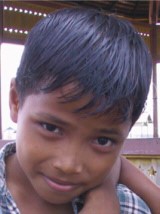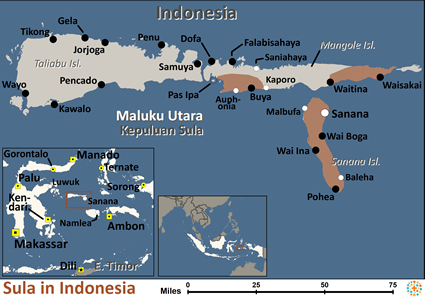Most Sula people live on the island of Sula, while some of them live on Mangole Island and in other parts of the Sula archipelago.
The Sula language has three dialects. The Sula language is part of a larger linguistic grouping called the Sula which also includes the Kadai, Taliabu and Mangole. In the distant past, the Sula archipelago was forcibly controlled by the Tidore Sultanate and Sulabesi became a port of call for spice traders. Long before Europeans knew of these "Spice Islands," tobacco from North Maluku and nutmeg from Central Maluku were being traded in other parts of Asia. With the coming of the Portuguese in 1511, extended conflict raged in this area. Finally, the Dutch won this conflict and gained enormous profit from the spice trade, until its decline at the end of the eighteenth century.
Most inhabitants of Sula make a living by hunting, fishing and gathering sago. Coconut trees are cultivated intensively, and the primary export commodity is copra (coconut that has been dried to be processed into coconut oil). Other goods include products from the forest, spices and salt-water fish.
The inhabitants of Sula make a living by hunting, fishing and gathering sago. Coconut trees are cultivated intensively, and the primary export commodity is copra (coconut that has been dried to be processed into coconut oil). Other goods include products from the forest, spices and salt-water fish.
The Sula people are followers of Islam. However, they still maintain many traditional beliefs. They mix elements of traditional customs with Islam, such as saying ritual prayers at places they consider sacred – to receive healing or other needs. They also believe in guardian spirits which they believe can give assistance when called by a shaman.
The people of Sula and the surrounding area need assistance to advance their community. To become more productive and efficient, the Sula community needs to be acquainted with appropriate technology. The unavailability of both formal and informal education leaves the Sula community lacking in opportunities to find work. The limited supply of electricity, clean water and health services also hinder development of the Sula community.
Pray for the Sula people to experience and embrace the glory of the Lord.
Pray for Sula elders to have dreams and visions of the risen Christ that will open their hearts to the one who is truth.
Pray for Sula disciples who will make more disciples, blessing their entire community.
Scripture Prayers for the Sula in Indonesia.
IPN, 2011 Copyrighted © Used with permission
| Profile Source: Joshua Project |

























